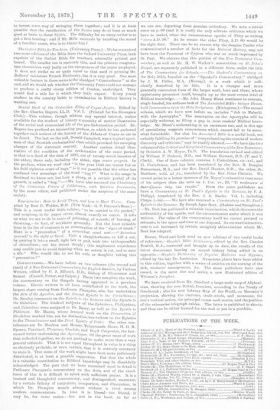COMMENTABIBS.—We have before us two volumes (the second and third)
of A New Testament Commentary for English Readers, by Various Writers, edited by C. J. Ellicott, D.D., Bishop of Gloucester and Bristol. (Cassell, Pettor, and Gulpin.) These two complete the work, the commentary on the Gospels having appeared in a previous -volume. Eleven writers in all have contributed to the work, the largest share coming from Professor Plumptre, who has undertaken the Acts of the Apostles, and the Second Epistle to the Corinthians ; Dr. Sanday comments on the Epistle to the Romans and the Epistle to the Galatians. The kindred subjects of the Ephesians, Philippians, and Colossians were assigned to Dr. Barry, as well as the Epistle to Philemon. Mr. Mason, whose learned work on the Persecution of Diocletian marked him out for distinction, has written on the Epistloe to the Thessalonians and the First Epistle of Peter. The other con- tributors are Dr. Moulton and Messrs. Teignmouth Shore, H. D. M. Spence, Puncher& Plummer, Sinclair, and Boyd Carpenter, the last- named writer undertaking the Apocalypse. Of the groat mass of work thus collected together, we do not pretend to make more than a very general estimate. That it is not equal throughout in value is a thing so obviously probable, or even certain, that it is scarcely necessary
to state it. That some of the work might have been more judiciously distributed, is at least a possible suggestion. But that the whole is a valuable contribution to Biblical knowledge may be thankfully acknowledged. The part that we have examined most in detail is Professor Plumptre's commentary on the Acts, and of the excel. /once of this it is difficult to speak with sufficient praise. It is a learned and thoughtful commentary, and distinguished, moreover, by a certain felicity of conjecture, comparison, and illustration, in which Dr. Plumptro stands almost without a rival among modern commentators. In tone it is liberal—too liberal, it may be, for some tastes -- but not in the least, as far as
we can see, departing from genuine orthodoxy. We note a trivial error on p. 83 (and it is really the only adverse criticism which we have to make), when the commentator speaks of Pliny as writing "circa A.D. 90." As he means the older Pliny, A.D. 60 would be the right date. There can be no reason why the Sergius Paulus who communicated a number of facts for the Natural Ristory, may not have been the Proconsul of Cyprus who was so much impressed by St. Paul. We observe that this portion of the New Testament Com- mentary, as well as Mr. H. W. Walker's annotations on 8t. John's Gospel, are separately published in a different form, under the title of The Commentary for Schools.-2'he Student's Commentary on the Holy Bible, founded OR the "Speaker's Commentary," abridged by J. M. Fuller, M.A. (Murray), is a work which is euffi- - ciently described by its title. It is a cheaper and more generally convenient form of the larger work, here and there, where opportunity presented itself, brought up to the most recent level of Biblical knowledge.—Mr. John Henry Blunt continues to execute, single.handed, his arduous task of The Annotated Bible : being a House- hold Commentary upon the Holy Scriptures. (Rivingtons.)—The second volume, which we have now before us, includes "Job to Malachi with the Apocrypha." The annotation on the Apocrypha will be especially welcome, as filling a gap in most readers' Biblical know. ledge. Mr. Blunt's undertaking is an enormous ono, and in this age of specialising suggests comparisons which cannot fail to be some- what formidable. But that his Annotated Bible is a useful book, not unfairly fulfilling its promise of "comprehending the results of modern discovery and criticism," may be readily allowed.—We have also two volumes of the Critical and Exegetical Commentary of the New Testament, by Heinrich A. W. Meyer, Th.D. The translation revised and edited by William P. Dickson, D.D., and William Stewart, D.D. (T. and T. Clark). One of these volumes contains I. Corinthians, xiv.-xvi., and II. Corinthians, and has been translated by the Rev. R. Douglas Bannerman, M.A., and the Rev. David Hunter, D.D.; the other, St. Matthew, xviii. ad fin., translated by the Rev. Peter Christie. We cannot point to a better instance of Dr. Meyer's exhaustive treatment of his subject than the note on I. Cm% xv., 29, "Ti Irwin-merle of f3arriC4tevot blrip Tim Ye6paly." From the same publishers we have a Commentary on St. Paul's Epistle to the Romans, by F. A. Philippi, translated by the Rev. J. S. Banks. Vol. I., including Chaps. L.viii.—We have also received a Commentary on St. Paul's Epistle to the Ronzans. By Joseph Agar Beet. (Hodder and Stoughton.) —Mr. Beet has published a valuable introduction, which discusses the authenticity of the epistle, and the circumstances under which it was written. The value of the commentary itself we cannot pretend to estimate, in the space and time at our disposal. Its outward attractive- ness is not increased by certain unsightly abbreviations which Mr. Beet has adopted.


































 Previous page
Previous page